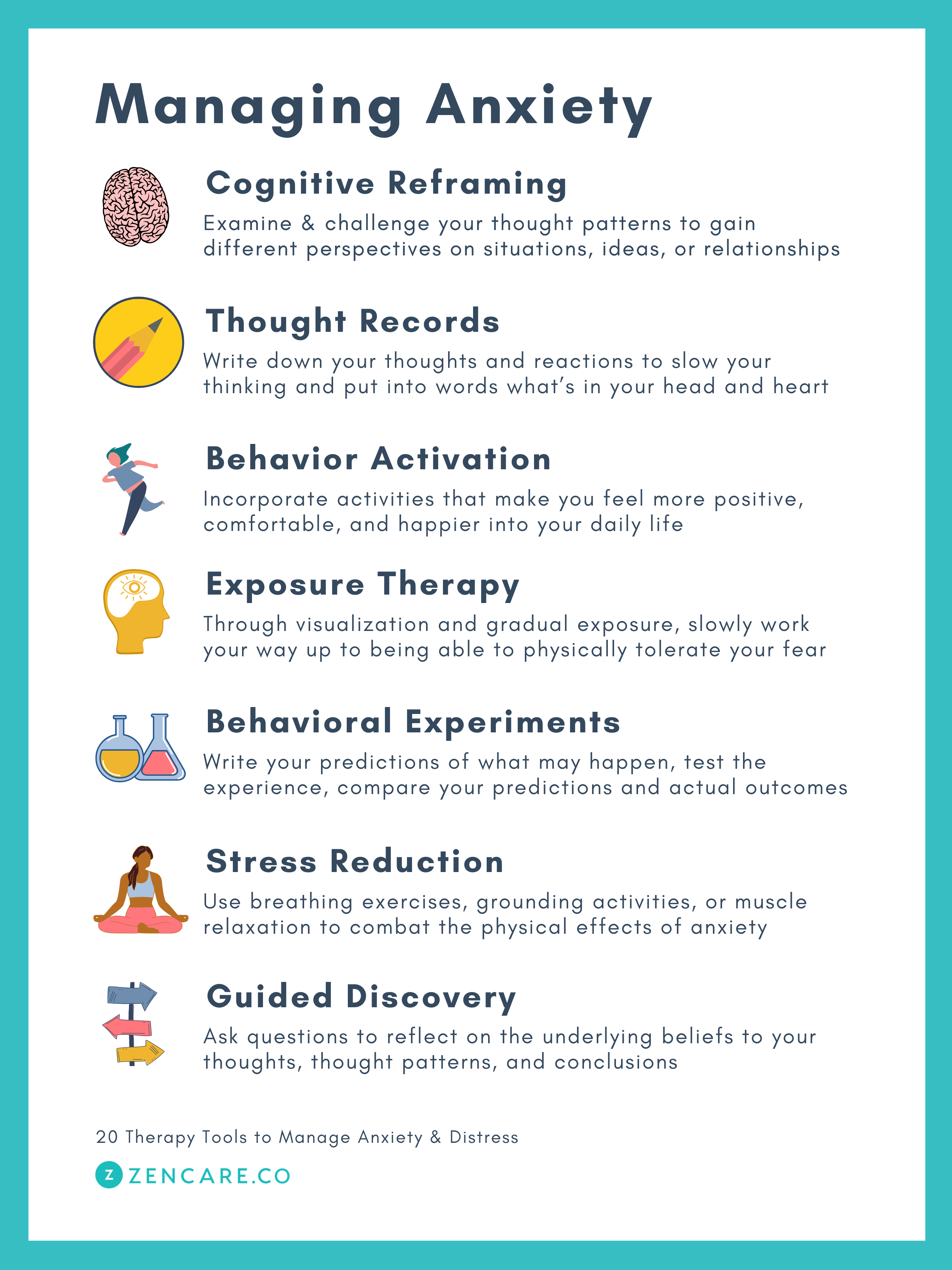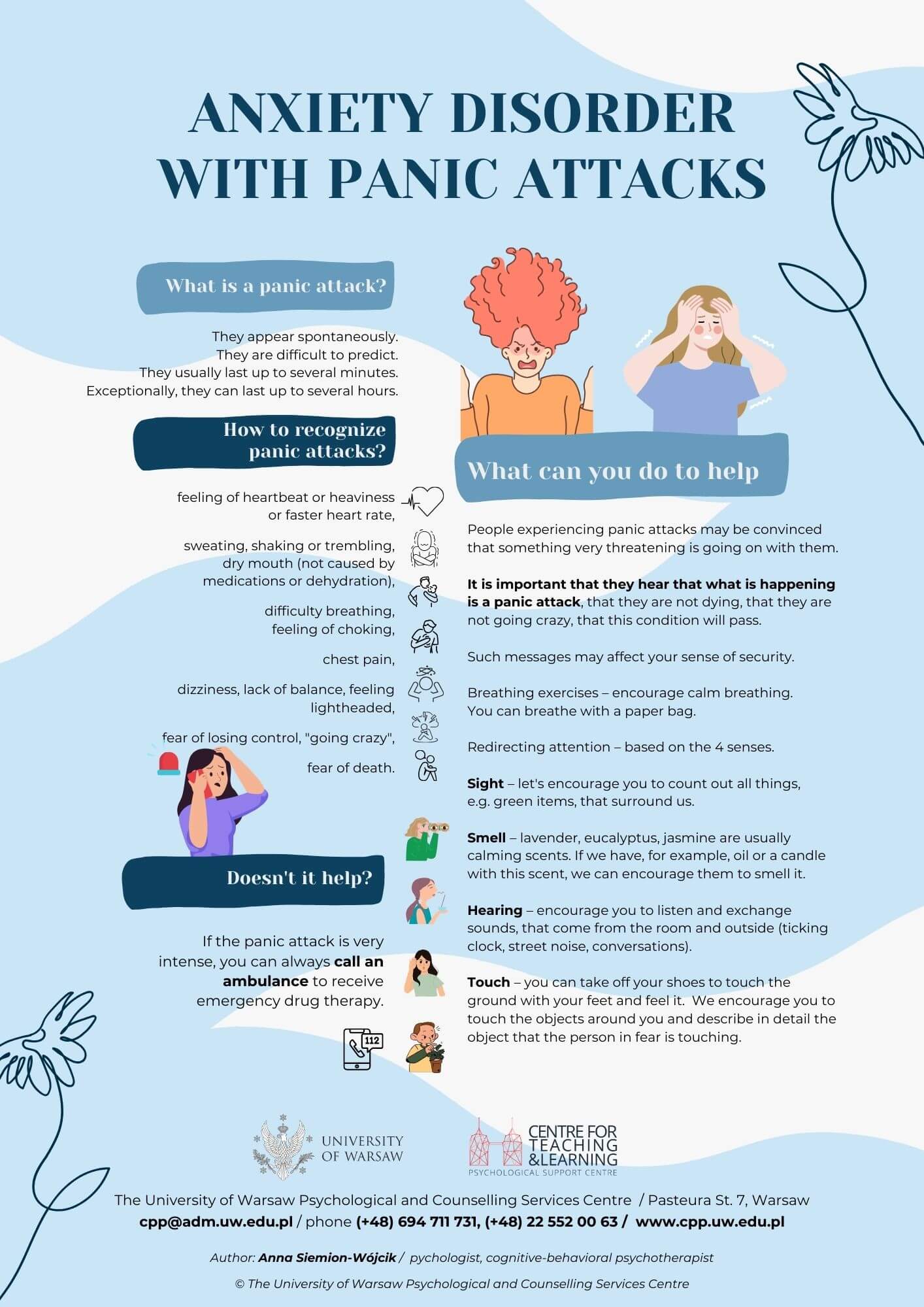Checking Out Various Methods in Coaching for Stress And Anxiety Condition for Enduring Modification
When dealing with stress and anxiety conditions, it's vital to explore a selection of therapy techniques. Each approach supplies unique insights and devices to help you manage your symptoms efficiently. You could locate that incorporating methods can generate the most effective results. Nevertheless, comprehending the subtleties of these methods is crucial to promoting lasting change. What happens if the ideal combination could launch a new level of emotional well-being for you?
Comprehending Stress And Anxiety Problems: A Quick Summary
Anxiousness conditions, which influence countless people worldwide, can considerably impact every day life. You could experience frustrating feelings of concern or fret that seem uncontrollable. These feelings can lead to physical signs and symptoms like a racing heart, sweating, or perhaps lightheadedness. Typical sorts of anxiousness disorders include generalised anxiety condition, panic condition, and social stress and anxiety condition. Each has unique indications, yet they all share a tendency to interrupt your regular and relationships.Understanding the origin of your stress and anxiety is vital. It may originate from genetics, mind chemistry, or life experiences. Identifying your triggers can help you manage your actions much better. It's essential to bear in mind that you're not alone in this struggle. Lots of people encounter comparable challenges, and seeking aid is a strong step towards feeling better. By learning more about anxiousness disorders, you're already on the course to understanding and managing your problem better.
Cognitive-Behavioral Therapy: Challenging Unfavorable Idea Patterns

Identifying Adverse Thought Triggers
Acknowledging the certain triggers behind your adverse ideas can be important in taking care of stress and anxiety when you encounter minutes of distress. Begin by taking notice of circumstances that provoke feelings of worry or worry. Is it a congested room, an upcoming target date, or a conversation with certain individuals? Write down these instances in a journal. This will certainly help you determine patterns in your thinking. Also, notice physical experiences that accompany your negative ideas, like a racing heart or rigidity in your upper body. By pinpointing these triggers, you gain insight right into what's sustaining your anxiety. Comprehending these connections is the initial step in testing those thoughts and eventually reclaiming control over your psychological reactions.

Changing Ideas With Positives
Testing unfavorable idea patterns is an important step in transforming your frame of mind and decreasing anxiety. You may often find on your own caught in cycles of self-doubt or catastrophic reasoning. Rather of allowing these thoughts dictate your feelings, practice replacing them with favorable affirmations or practical alternatives. When you assume, "I can't handle this," move it to, "I can handle obstacles one step at a time." This easy change can significantly affect your mood. On a regular basis recognizing and responding to these unfavorable thoughts helps produce a healthier inner discussion. Remember, it takes some time and initiative, yet consistently practicing this technique can cause long-term modification, empowering you to face stress and anxiety with renewed self-confidence and strength
Building Coping Methods Together
Replacing unfavorable thoughts is only the beginning of handling anxiety efficiently. To create enduring adjustment, you need to build coping strategies that empower you. Cognitive-Behavioral Therapy (CBT) helps you determine and test those purposeless thought patterns. With each other, you and your counselor can discover just how these ideas effect your feelings and behaviors.Start by establishing useful methods, like journaling or mindfulness exercises, that allow you to face anxiousness head-on. When you encounter your fears progressively, you'll find out to react differently.

Mindfulness and Acceptance-Based Approaches: Cultivating Present-Moment Understanding
As you browse the intricacies of anxiousness, including mindfulness and acceptance-based strategies can considerably improve your capacity to grow present-moment understanding. By concentrating on the right here and now, you'll locate that you can observe your ideas and feelings without judgment. This technique helps you acknowledge your anxiety without really feeling bewildered by it.Engaging in mindfulness exercises, such as deep breathing, body scans, or directed reflections, enables you to ground on your own in your present experience. Acceptance-based methods encourage you to accept your feelings instead of fight against them. They lose their power over you.Incorporating these techniques into your daily regimen can change just how you react to anxiousness when you accept your sensations. You'll develop strength and learn to browse difficult situations with higher simplicity. Eventually, cultivating present-moment understanding lays the foundation for long lasting adjustment, equipping you to lead a more fulfilling life.
Exposure Therapy: Challenging Fears Progressively
Direct exposure treatment aids you challenge your worries in a gradual means, making it much less overwhelming. You'll find out techniques to face anxiety-provoking scenarios step by step, while likewise building coping methods to handle your reactions. This method equips you to take control and lower anxiety gradually.
Gradual Direct Exposure Techniques
When encountering anxiousness, gradually confronting your worries can be an effective way to regain control. This method, called gradual direct address exposure, involves slowly exposing on your own to the scenarios or things that activate your stress and anxiety. Beginning with less daunting scenarios and slowly function your method up to more difficult ones. For example, if you hesitate of public speaking, you might start by speaking in front of a mirror, then advance to sharing thoughts with a close friend, and ultimately attend to a little group. Each action assists desensitize you to the worry, constructing your self-confidence with time. Keep in mind, it's important to rate on your own and click here to read commemorate tiny victories as you relocate via this process, reinforcing your capacity to take care of stress and anxiety effectively.
Structure Coping Methods
Building efficient coping approaches is crucial for handling stress and anxiety, especially as you confront your fears slowly. One powerful approach is direct exposure treatment, where you start by facing your concerns in a regulated fashion. Start with less intimidating scenarios and slowly function your method up to more challenging situations. This gradual exposure aids desensitize you to anxiety causes, making them much less overwhelming.Incorporate leisure methods, such as deep breathing or mindfulness, to soothe your mind during exposure. Track your progression, celebrating small triumphes in the process to increase your confidence. Keep in mind, it's alright to take your time; the goal isn't perfection but steady enhancement. By building these techniques, you'll encourage on your own to browse stress and anxiety and embrace life much more fully.
Psychodynamic Therapy: Revealing Origin of Stress And Anxiety
Psychodynamic therapy checks out the unconscious mind, exposing the origin causes of your stress and anxiety - Counseling services for anxiety. By analyzing your thoughts, feelings, and past experiences, this approach helps you discover underlying problems and unsettled concerns that might add to your existing stress and anxiety. You'll work with a therapist to explore childhood experiences, partnerships, and emotional patterns that shape your feedbacks today.As you obtain insight right into these deeper layers of your mind, you'll start to acknowledge how previous events affect your present behavior. This understanding can lead to catharsis, allowing you to process feelings you might have suppressed.Through the therapeutic partnership, you can likewise determine defense reaction that might have developed with time, offering a more clear course to alter. Eventually, psychodynamic therapy equips you with the tools to address your anxiousness at its core, promoting long-term makeover in your psychological wellness
Integrative and Holistic Techniques: Integrating Strategies for Greater Efficacy
Incorporating various therapeutic techniques can boost your journey toward managing anxiousness extra successfully. By incorporating aspects from cognitive-behavioral treatment, mindfulness techniques, and holistic techniques, you can develop a tailored technique that resolves your unique requirements. You could make use of cognitive-behavioral methods to challenge adverse idea patterns while incorporating mindfulness workouts to ground yourself in the existing moment.Additionally, discovering alternative methods such as yoga or meditation can promote relaxation and decrease stress and anxiety symptoms. This blend allows you to create official source greater self-awareness and resilience.Experimenting with these diverse methods can aid you discover what reverberates most with you. Remember, it has to do with finding a synergy that functions, as opposed to staying with a solitary method. This integrative approach not just provides immediate relief but also cultivates long-lasting abilities for managing anxiousness, empowering you to redeem control over your life.
The Role of Support Solutions: Structure Resilience Via Connection
While it may appear that handling anxiety is a solitary journey, having a solid support group can play a crucial duty in your durability. Bordering on your own with compassionate close friends, family, or support system produces a safe space where you can honestly share your experiences and feelings. When you get in touch with others, you advise on your own that you're not alone in this struggle.These relationships provide inspiration and can provide sensible coping approaches that have helped others. It's also a possibility to gain point of view; good friends can assist you see scenarios differently, reducing feelings of isolation.Moreover, emotional support cultivates a feeling of belonging, which can greatly reduce anxiety symptoms. By leaning on your support group, you can build resilience and tackle challenges much more properly. Remember, getting to out for assistance signifies toughness, and it can make all the distinction in your journey towards taking care of anxiousness.
Frequently Asked Inquiries
What Are the Common Signs of Stress And Anxiety Problems?
You could experience restlessness, tiredness, trouble concentrating, irritation, muscle mass stress, and rest disturbances. Physical symptoms can include fast heart beat, sweating, and shivering. Identifying these indications early can help you seek proper assistance and treatment.

How Long Does Treatment Usually Last for Anxiety Disorders?
Treatment for anxiety conditions usually lasts anywhere from a few weeks to several months. It actually relies on your private needs, progression, and the strategies your therapist utilizes to assist you handle your anxiousness effectively.
Can Drug Be Made Use Of Along With Therapy for Stress and anxiety?
Yes, medication can absolutely be made use of together with therapy for anxiety. Combining both methods typically enhances treatment performance, assisting you take care of signs and symptoms while checking out underlying concerns through counseling. Constantly consult your doctor for individualized advice.
Are There Self-Help Methods for Taking Care Of Anxiety?
Yes, there are several self-help methods for taking care of anxiety. You can exercise mindfulness, participate in regular workout, maintain a well balanced diet, establish a regular, and utilize deep breathing strategies to help in reducing anxiousness signs efficiently.
Just how Do I Know if I Need Expert Aid for Anxiousness?
You ought to consider seeking professional aid for anxiety if it interferes with life, creates considerable distress, or if self-help methods aren't working. Trust your impulses; getting to out can cause far better coping abilities and support. Typical kinds of stress and anxiety problems include generalised stress and anxiety condition, panic disorder, and social stress and anxiety problem. When you experience minutes of distress, recognizing the details triggers behind your unfavorable ideas can be necessary in handling anxiousness. Replacing adverse thoughts is just the start of managing stress and anxiety effectively. By examining your ideas, sensations, and previous experiences, this method aids you reveal underlying conflicts and unsettled concerns that may add to your current stress and anxiety. It's also an opportunity to gain viewpoint; friends can aid you see circumstances in different ways, lowering feelings of isolation (Counseling services for anxiety).Moreover, emotional support promotes a sense of belonging, which can substantially alleviate anxiety signs